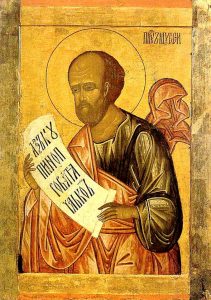Thoughts on Sunday’s Lessons for Oct. 8, 2023
First Reading (Track One): Exodus 20:1-4, 7-9, 12-20

Moses the Prophet, Eastern Orthodox icon from the 1590s, depicts Moses holding the tablets of the Ten Commandments. We hear the Exodus account of Moses receiving the Ten Commandments in our Track One first reading this week. (Click image to enlarge.)
God commands. We the people try to obey; but it isn’t always easy. Listen for this theme in Sunday’s Track One readings. In our first reading we find Moses at Mount Sinai in the desert, where Moses has met God face-to-face on the mountain and brought the Ten Commandments down to the people. Establishing their identity and their hope, the people join in covenant with God, accepting the commandments that will guide their lives and ensure their righteousness in relationship with God and others.
First Reading (Track Two): Isaiah 5:1-7
In Isaiah’s poetic song God plants a vineyard and cares for it with love. But the harvest yields wild grapes: “stinking, worthless, sour” fruit in the original Hebrew. What happened? The vines metaphorically stand for the people, who disappointed God by failing to be just and righteous. Now God will trample down the vines, destroying the vineyard. Early in Isaiah’s long book of prophecy he is already setting the scene for a people defeated in war, their city destroyed, sent into exile. Listen for vineyard metaphors through Sunday’s Track Two readings and ponder their relationship.
Psalm (Track One): Psalm 19
God’s commandments are a wonderful gift, a gift that shows God’s glory in such a shining light that all the heavens sing: All the skies reveal the work of God’s hand! This triumphant Psalm begins with mighty praise for the beauty of all God’s creation. Then the theme turns to a hymn of praise for the commandments, God’s law and teaching. True, just and righteous, God’s commandments stand even above the earthly creation that we have just celebrated. They are sweeter than honey, more precious than gold.
Psalm (Track Two): Psalm 80:7-14
The Psalmist might well have had Isaiah in mind while writing these poetic verses. Isaiah had warmed that a disappointed, angry God, loathing the sour fruit, would demolish the vineyard, tearing down its wall and hedge and ordering a drought to lay it waste. This Psalm imagines a people who brought a vine out of Egypt, made it mighty, but then neglected it and let it wither. But now we beg a compassionate God to regard and restore the bountiful vines, bringing in a hint of hope that is not found in the dark verses of our Isaiah reading.
Second Reading: Philippians 3:4b-14
Paul has left his church community in Philippi to travel onward. Now other Christians preaching a more conservative Jewish view of Christianity have come to this church in Greek Macedonia and told the people that, despite Paul’s teaching, if they wish to be Christians they must follow Jewish law – including purity laws and circumcision. Paul pushes back in this letter. He points out that he is a devout Jew himself, and a Pharisee too, observant and righteous. But now. he says, everything has changed: The old commandments, he says, mean nothing without Christ.
Gospel: Matthew 21:33-46
Jesus challenges the temple authorities with one of his difficult parables involving vineyards and the people who work in them. When this vineyard owner went to another country, he hired tenants to produce the grapes for him while he was away. But when he sent slaves to pick up the produce, the tenants beat them up and killed them. Next, remarkably, they did the same to the owner’s own son! What, Jesus asked, would the owner do? Surely he will kill the evil tenants, the priests and Pharisees respond. But Jesus turns the parable back on them: It is those who work to produce fruit who will inherit the Kingdom of God. Angered, the temple leaders start plotting to arrest Jesus.
What are “Track 1” and “Track 2”?
During the long green season after Pentecost, there are two tracks (or strands) each week for Old Testament readings. Within each track, there is a Psalm chosen to accompany the particular lesson.
The Revised Common Lectionary allows us to make use of either of these tracks, but once a track has been selected, it should be followed through to the end of the Pentecost season, rather than jumping back and forth between the two strands.
For more information from LectionaryPage.net, click here
